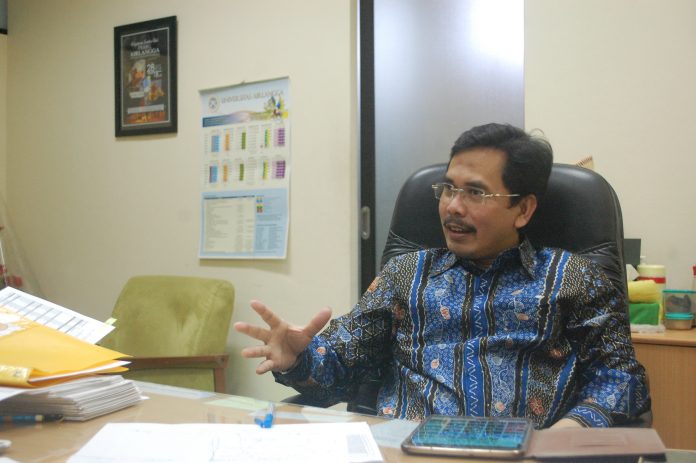UNAIR NEWS – Universitas Airlangga (UNAIR) as one of most popular universities in Indonesia continues to improve its quality, both from campus management and the quality of its students. One of the goals that UNAIR continues to strive for in recent years is improving its quality and reaching Top 500 World Class University (WCU).
There are a lot of factors related in achieving of this objective. One of them is student organization (ormawa) and UNAIR students themselves.
Dr. M. Hadi Subhan, S.H., M.H., CN., Director of Student Affairs UNAIR told UNAIR NEWS that all students should have hard skills and soft skills . Hardskill can be obtained through teaching and learning activities in the classes, while soft skills can be developed outside the classroom such as following organizations.
“Even though soft skills can be obtained in classes, such as when having presentations and teamwork practice, but they are not enough and should be developed by participating in activities outside classroom such as joining students or external organizations,” Hadi explained.
Even so, joining organizations for students is not the goal, but the means. It is not everything. So, it is not a big problem if someone is not elected at the general election (pemira) either at the faculty or university level.
“Training leadership skill is not only from BEM. If you are not elected at BEM, you can try it in other organization, “said Hadi.
Although UNAIR has many students organizations at the university level, such as BEM UNAIR, BO / BSO under BEM UNAIR, UKM, MPM and DLM. As well as at the faculty level there are faculty BEM, BLM, BO / BSO under the faculty BEM, Hadi advised students not let them divide them.
“Student organization just becomes our clothes. While our body is one, UNAIR. By being active in organizations, don’t make more enemies, you have to have more friendships,” Hadi explained.
Meanwhile, to help UNAIR in reaching Top 500 WCU, there are things that need to be done by the student executive board and the legislative board in UNAIR.
Executive Board
Besides BEM, UKM, BO / BSO is also the executive body in UNAIR. To help UNAIR reaching Top 500 WCU, one of the things that can be done by the university BEM is to collaborate with foreign universities such as holding international conferences. For example the Airlangga international conference ASEAN + 3 Youth Conference and Cultural Program (AAYCCP) which was held some time ago by BEM UNAIR by inviting fifteen countries.
Meanwhile, UKMs can also direct their interests and talents of their members to achieve International achievements. Such as pencak silat club which won several times abroad.
At the faculty level, BEM can encourage students to take part in exchange programs, establishing network and being active in international organizations.
“As in Faculty of Law, there is Asian Law Student Association. One of our students used to be the president of the Asian Law Student Association, “said Hadi.
Legislative Board
In contrast to the executive body, at university level (DLM and MPM) and faculty (BLM), DLM and BLM as the legislative body should support UNAIR to reach Top 500 WCU by performing their functions properly.
Such as by supervising BEM activities, working on the legislative function of making the regulation, then also having to guard the democratic process at university level in DLM and faculty level, BLM.
Meanwhile, MPM which consist of representatives from each faculty in UNAIR is tasked with electing the president of BEM UNAIR.
“For example, DLM has a role in overseeing the activities of university leaders,” Hadi said.
As UNAIR has been assessed by various stakeholders, such as by getting award as the Best State University for Student Management. It is achieved because UNAIR became the only university that already has complete regulations relating to the student organizations and they are contained in the rector’s regulations. In the future, Hadi hoped that all UNAIR students can be a solid team and be useful for students and student organizations.
“From, to, and by students. ‘From’ ie students who are active in organizations . ‘By’ ie students as subjects, actors or agents . And ‘for’ means all done by the students organizations are for students, “concluded Hadi. (*)
Author: Galuh Mega Kurnia
Editor: Binti Q. Masruroh





